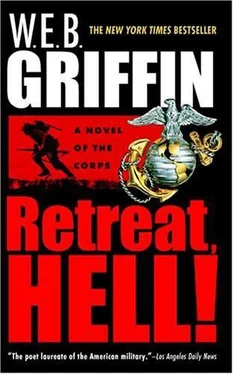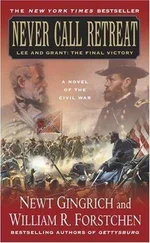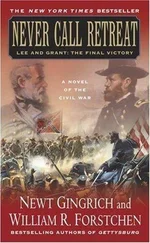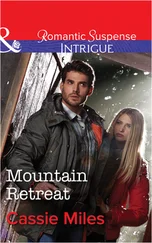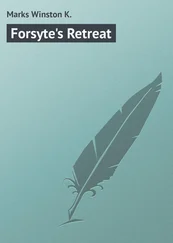Dunwood wondered about the purpose of the checkerboard building. Every airport seemed to have one, but he had no idea of what they were for.
Probably because he didn't really give much of a damn about either the Air Force or the Army, neither did he have any idea what the relationship between the two was with respect to airplanes. Now he was wondering about that, too. When, during the night, Major Alex Donald had taken off his spiffy fur-collared zipper jacket—which Dunwood had belatedly recognized to be a pilot's jacket— there were silver pilot's wings pinned to his chest. There were also metallic representations of the old-time wigwag signal flags on his collar point. Dunwood recognized that as the insignia of the Army Signal Corps.
Putting that all together, Major Donald was an Army Signal Corps officer— in other words, an officer whose specialty was communications—who was also a pilot, presumably of these secret aircraft about to arrive to usher in a new era of battlefield mobility.
Where did the Air Force fit into this? Weren't airplanes the province of the Air Force? Until just now, Dunwood thought the only airplanes the Army had were little Piper Cub-like two-seaters used for artillery spotting, and a handful of helicopters, tiny little flying machines in which the pilot sat in a huge plastic bubble and whose only purpose Dunwood could see was to haul either the brass from point to point or to haul the wounded in a side-mounted stretcher rack.
Dunwood knew that his success as a DeSoto-Plymouth salesman had been in large part due to his ability to get people to tell him just about anything he wanted them to. Knowing your customer was the first, and most important, step in making a sale, and he had been damned good at finding out whatever he had wanted to know.
That skill had failed him in the long hours of the night. Major Alex Donald had told him no more than what he'd told him when he had first appeared at the hangar, and finally had made it very clear that Dunwood's persistent curiosity was very unwelcome.
There came the sound of multiple aircraft engines.
Dunwood looked into the sky toward Inchon. There were three Corsairs slowly approaching the airfield. They were flying one above the other, separated by two hundred feet or so. The lowest was maybe 1,500 feet above the ground.
"There they are," Major Donald cried, excitement in his voice.
"Major," Dunwood said, "those are Corsairs. Marine Corsairs."
"Not there, Captain," Major Donald said, as if speaking to a retarded child. "There!"
Dunwood looked at him. The major had his arm extended toward the horizon in the direction of Inchon.
Dunwood looked where Donald was pointing.
There were two objects in the air, perhaps two hundred feet off the deck, approaching the airfield from the direction of Inchon. They looked not unlike olive-drab dragonflies, a large body supported by a lot of flapping wings, or whatever.
In a moment, Dunwood realized they were helicopters, the largest he had ever seen.
"Well, Captain," Major Donald said. "What do you think about that?"
Dunwood, who didn't know what to think, said nothing.
It was maybe sixty seconds before the first of the helicopters reached the hangar, flared, and then settled to the ground. By then, Dunwood saw, perhaps half of his men had climbed out of their foxholes and other emplacements to get a better look. Two Marines were standing on top of the checkerboard-painted building.
As they had rehearsed during the night, eight Marines under Sergeant Al Preston trotted up to push the aircraft into the hangar.
As it was pushed past him, Dunwood saw a legend painted in yellow on the fuselage just behind the side door of the cockpit: US ARMY MODEL H-19A.
The second helicopter settled to the ground.
"Shake a leg, men!" Major Alex Donald shouted. "We've got to get these aircraft out of sight before anyone sees them."
[THREE]
The House
Seoul, Korea
O55O 29 September 195O
Major Kenneth R. McCoy, USMCR, now wearing crisply starched Marine utilities, with the gold oak leaves of his rank pinned in the prescribed place on the collar points, and even wearing aftershave lotion, walked into the dining room.
Master Gunner Ernest W. Zimmerman, USMC, similarly attired and shipshape, was sitting at one side of the heavy carved wooden table, spreading butter on a piece of toast.
The two men nodded at each other. Zimmerman opened his mouth as if to say something, but stopped when the middle-aged Korean woman entered from the kitchen carrying a silver coffeepot.
She bowed to McCoy, he bowed back, and she poured a cup of coffee for him. She asked him what he wanted for breakfast, and he asked what was available, and she told him, and he ordered what Gunner Zimmerman had had— ham, eggs up, home-fried potatoes, and toast.
When she passed through the door to the kitchen, McCoy sat down across the table from Zimmerman.
"I wonder what the other Marines in Korea are having for breakfast this morning," he said, helping himself to a piece of Zimmerman's toast.
"My mother used to try to make me eat oatmeal by telling me about the starving kids in India," Zimmerman said. "Same answer. I don't give a damn what's on anyone else's plate." He pointed at his plate. "This is the only one that counts."
"I'm shocked at your cruel selfishness," McCoy said in mock indignation.
"Neither do you, Killer," Zimmerman said, chuckling. "Be honest."
McCoy smiled.
"You know what I was thinking, though?" Zimmerman asked.
"No."
"What did finding your next day's uniform sitting all pressed and shipshape on your bed last night remind you of?"
"Shanghai, 4th Marines, houseboys?" McCoy responded. "Sergeant Zimmerman and Corporal McCoy?"
"Yeah."
"Hard whiskey and wild, wild women, before we became respectable, married, officers and gentlemen?"
"What I was thinking was we haven't come that far in ten years," Zimmerman said.
"Then, ten years ago, I would have been happy to think I could make staff sergeant in ten years," McCoy said.
So now you're a field-grade officer, and I make as much money as a captain—"
"And own half of Beaufort, South Carolina. . . ."
"—and people are still shooting at us."
“Nobody shot at us yesterday, Ernie."
"With you and that goddamn Russian jeep, we almost got blown away by our own side," Zimmerman said.
The door from the foyer opened and two middle-aged men in mussed and soiled Army fatigues walked in. One of them had a Garand rifle slung over his shoulder; there were two eight-round clips of ammunition on the strap. The other carried a U.S. Submachine Gun, Caliber .45 ACP M-3, in his hand. The weapon, made of mostly stamped parts, was called a Grease Gun because it looked like a grease gun.
Zimmerman glanced up at them, and then in a Pavlovian reflex jumped to his feet and barked, "'Ten'hut on deck!"
McCoy, in another Pavlovian reflex, stood to attention.
"As you were," one of the two newcomers said, then added, "Good morning."
"Good morning, sir," McCoy and Zimmerman said, almost in unison.
Major General Ralph Howe, NGUS, walked to the table and hung his Grease Gun over the back of one of the heavy chairs and sat down. He looked at Zimmerman.
"Ernie," he said. "I thought I told you I'd rather you didn't do that every time I walk into a room."
"Force of habit, sir," Zimmerman said. "Sorry, sir."
The other man, whose sleeves carried the stencil-painted chevrons of a master sergeant, shook his head in resignation, then hung his rifle over the back of another chair and sat down.
General Howe gestured with his hand for McCoy and Zimmerman to sit down.
Читать дальше
